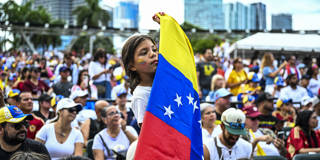In Donald Trump’s White House and broader orbit, there are three differing views on how to engage with Venezuela: one is focused on restoring democracy, another has embraced pragmatism, and a third supports military intervention. The view that prevails will likely reflect all three.
WASHINGTON, DC – Venezuela’s future will be largely shaped by US policymakers and lobbyists over the next year. Although Donald Trump’s administration has yet to formulate a unified position on the country, it will probably do so sooner rather than later, given the many important US interests at stake. These include Venezuela’s vast oil reserves and high prevalence of drug trafficking and organized crime; its government’s assault on democracy and human rights (which has resulted in heavy US sanctions); the historic exodus of millions of Venezuelans; and China’s growing influence in the region.

WASHINGTON, DC – Venezuela’s future will be largely shaped by US policymakers and lobbyists over the next year. Although Donald Trump’s administration has yet to formulate a unified position on the country, it will probably do so sooner rather than later, given the many important US interests at stake. These include Venezuela’s vast oil reserves and high prevalence of drug trafficking and organized crime; its government’s assault on democracy and human rights (which has resulted in heavy US sanctions); the historic exodus of millions of Venezuelans; and China’s growing influence in the region.